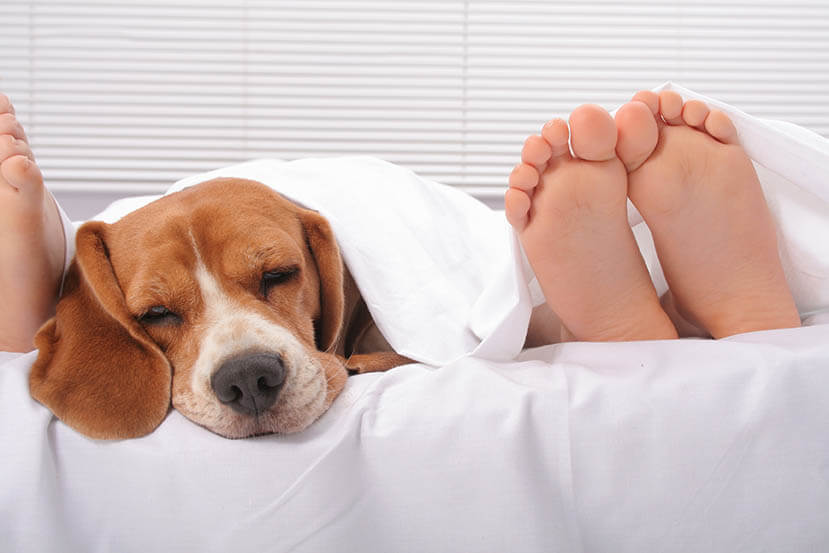Co-Sleeping With Dogs

Research shows that almost half of pet owners share their bed or bedroom with their pet. Well-meaning friends and family members may tell you that co-sleeping with dogs isn’t right. Their opinion might be that dogs should only sleep in their own beds, on the floor, or in a crate. However, there are science-backed benefits to co-sleeping with dogs.
Sleep Problems
It has been found that the sleep problems of pet owners are often due to their pets. A study conducted by Sealy in Australia found that pet owners took longer to fall asleep and often wake up tired. Although they were no more likely to wake in the night than those without pets, if they did it was due to their pets. The only solution here is to own no pets, perish the thought.
Interestingly though, participants reported the same perceived number of sleep hours, and feeling no more tired throughout the day as those poor dogless participants. So let’s take a look at how co-sleeping brings benefit to us dedicated pooch lovers.
Perks of Co-Sleeping
A 2017 study conducted in the US found that the benefits to co-sleeping dog guardians outweighs any negatives. Researchers tracked the sleep habits of 40 healthy adults and their dogs over a five-month period. They deduced sleeping with dogs in the room actually helped the participants sleep better. The size of the dog made no difference to their findings. However, adults who slept with their dogs on their bed did sacrifice sleep quality.
How to Make Co-Sleeping Work for You
Here are some tips to keep the bedroom as battle-free as possible:
- Bedtime not playtime. Make ‘no toys in the bedroom’ a solid rule. Be strict about it. Training your pooch to obey the commands ‘leave’ or ‘give’ will back up those rule, and enforce it at the bedroom doorway. Take care with dogs that guard their toys. Attempting to take their favourite chew-thing from them might result in a negative interaction – unhelpful in the middle of the night. In this instance, they urgently require consistent rules and frequent training during the waking hours to break this bad behaviour.
- Puppy to big dog. You may have adopted a puppy that fits perfectly between your knees as you sleep. But what happens when that small bundle of fluff turns into a large, heavy dog? As hard as it may be, refrain from bed sharing until you know how big your puppy will become. It’s a better option, don’t allow them to become accustomed to sleeping curled up next to their beloved guardian, only to tale the privilege away. Either that, or buy a super king size bed.
- Invite them into the bedroom. Another great tip is to not give them free rein. Your bed isn’t theirs to lounge on at any time of the day. Make them wait until you call them into the bedroom at bedtime. This will serve as an added signal that it is time to curl up, get comfortable and go to sleep.
- Exercise and food. It’s important that dogs take their individual exercise requirements. This is especially true for co-sleeping pups and guardians. At night, they will be nice and tired. Make sure they are well fed, with their last meal a good three or four hours before bedtime. This will give time for digestion, energy release and evacuation.
- Monitor daytime naps. Be mindful of how long your dog sleeps during the day. Though dogs have different sleep patterns to us, it is very possible to ensure the bulk of their deep sleep is with you, at night. Read more about the nature of a dog’s sleep in Does Your Dog Dream?
Follow these helpful tips, and read more about improving your dog’s sleep in Why Your Dog is Restless at Night. Be vigilant, and both you and your dog will be on your way to having a good night’s cuddly sleep.
